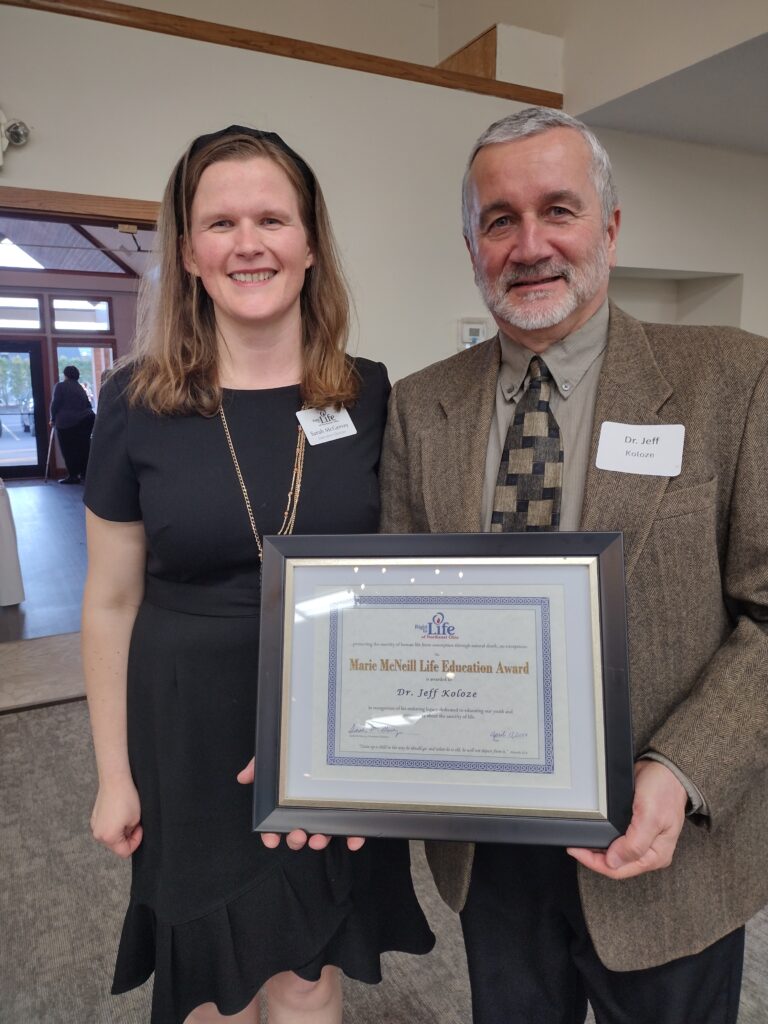
Welcome! Since my research concerns the right-to-life issues of abortion, infanticide, and euthanasia in literature, this page contains representative published papers on a variety of topics with links to one of a few sites where the papers have been published.

The Speech I Would Have Given on Receiving the Marie McNeill Life Education Award
Left to right: Sarah McGervey, Executive Director of Right to Life of Northeast Ohio, and Dr. Jeff Koloze at the Celebrate Life Dinner (4-13-24)
My wife Joan asked, no, begged me not to say anything about her in this thank you speech. After I kept annoying her, she surrendered and said that one word would suffice.
However, the one word “because” doesn’t suffice. Besides that, when does any husband ever listen to his wife?
In graciously giving me this award, you are simultaneously awarding Joan for her own half century of pro-life activism.
Consider. While Jeff was going to all those big bad right-to-life meetings, it was Joan who fed the kids supper and who ironed their school uniforms.
While Jeff was managing the National Right to Life voter ID phone banks for Cleveland Right to Life, it was Joan who looked up phone numbers for the precinct books when lists of registered voters only printed their names and addresses.
As a final example, while Jeff was flying around the United States and Canada and Rome, presenting his scholarly research on pro-life issues in literature at academic conferences (scholarly papers that no one ever reads), it was Joan who was cleaning the cat litter and dealing with two teenaged boys and twin teenaged girls while Dad was away.
Thank you, therefore, for honoring my wife as well as me with this award.
Accepting this award could be perilous. One could merely sit back, stop doing pro-life work, and bask in a beautiful honor. I vow that I will never do that. Like the disciples on the road to Emmaus, even if I wanted to say nothing more about right-to-life, pro-life work would burn inside me to the point where I could never hold it in.
Therefore, since I want to live thirty-five more years and reach my cent’anni compleanno (one hundredth birthday), I trust that I could tell St. Joseph that I made thousands more calls for pro-life candidates like President Trump and Bernie Moreno, that we donated thousands more of our retirement dollars to pro-life groups, and that we encouraged all of you, especially the newer generations of pro-life activists, to fight the good fight for our premiere civil rights movement.
May God bless all of us in our work. Thank you.
Anthology of Right-to-Life Literature: Establishing the Canonical Maturity of a Vibrant Social Force
This paper argues that there is an urgent need to anthologize major pro-life works which have shaped the right-to-life movement. After reviewing the methodology for locating and obtaining such works, the paper examines various problems in determining which works merit being included in such an anthology. The author establishes four criteria by which hundreds of pro-life works have been evaluated for inclusion: they must have been published since the 1960s, they must have been written or translated into English, the authors must be either life-affirming themselves or approach standard pro-life views on the essential three life issues, and the works must have obtained a level of commercial success such that their impact either on the pro-life community or on the larger culture is profound. The paper then discusses twenty-four works, highlighting their major contributions to the pro-life movement. The paper ends with future research and recommendations.
Right-to-Life Issues in Contemporary Bioethics Fiction
This study reviews literary works from the twentieth and twenty-first centuries which concern bioethical aspects involving the foundations of the right-to-life issues of abortion, infanticide, and euthanasia. After considering definitions of “bioethics” from various sources, the paper derives three general principles from the literary works and examines how each of these principles is depicted. Finally, the research highlights fictional works which include ethical standards developed by religious sources, filling the ethical void created by most bioethics fiction.
When Culture Is Challenged by Art: Pro-Life Responses in the Art of T. Gerhardt Smith to Cultural Aggression Against the Vulnerable
This paper examines three paintings by T. Gerhardt Smith as pro-life responses to the life issues of abortion, infanticide, and euthanasia: Sorrow Without Tears: Post-Abortion Syndrome, Femicidal National Organization Woman’s Planned Parentless Selfish Movement, and Killer Caduceus. After identifying foundational principles of art aesthetics from a Catholic perspective, the paper determines that Smith’s paintings are consistent with ideas enunciated in St. John Paul II’s Letter to Artists (1999).
“We a People Who Give Children Life”: Pedagogic Concerns of the Aborted Abortion in Lorraine Hansberry’s A Raisin in the Sun
This paper examines the abortion references in Lorraine Hansberry’s A Raisin in the Sun.
Right-to-Life Issues in Contemporary Gay and Lesbian Literature
This study examines a rarely explored area of pro-life concern, the impact of the gay and lesbian movement on the life issues of abortion, infanticide, and euthanasia. Although the gay and lesbian political movement, especially the aggressive one of the late twentieth and early twenty-first centuries, may seem to have nothing to do with the life issues, the philosophical foundations of the gay and lesbian distortion of heterosexual normativity need to be examined to understand why adherents of this political perspective are closely aligned with anti-life forces. Despite this allegiance, the literature itself comports more with, if not an overtly pro-life philosophy, then a life-affirming one. That is, there is little evidence in gay and lesbian literature to suggest that persons with same-sex attraction necessarily support the killing of the unborn, the handicapped newborn, or the medically vulnerable or aged (the three groups of human beings targeted by the anti-life movement). Finally, the literature provides an opportunity for persons with same-sex attraction to renounce their political allegiance with the destructive social force known as the gay and lesbian lobby and, instead, align itself with the pro-life movement, which is more compatible with their efforts to seek authentic love in a world which distorts sexuality.